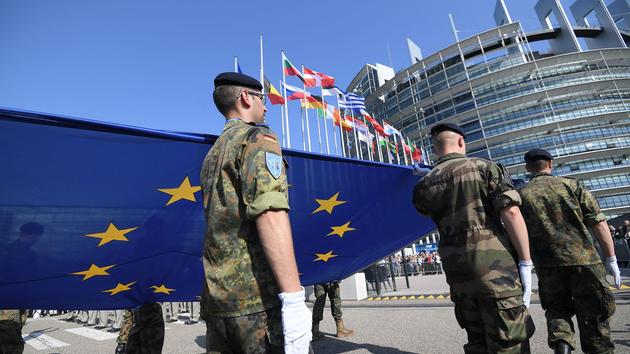Cyril Hofstein is a senior reporter for Le Figaro.
Today's new global strategic environment is characterized by its complexity, rapid change and unpredictability.
In addition to the hybrid security challenges, mixing state and non-state actors, and which reduce the border between war and peace, there is now added the uninhibited return of the balance of power in international relations, on the very periphery of the European space.
No country can face all of these challenges alone.
In its desire to develop its strategic autonomy, beyond the economic, industrial and digital aspects recalled at the European summit of October 1-2, 2020, by the President of the Council, Charles Michel, Europe must also strengthen its defense and security.
Although NATO remains the cornerstone of the collective defense of the Euratlantic space and the crucible of interoperability between Allies and partners of the Atlantic Alliance, the Member States of the European Union must continue their efforts to develop their military capabilities.
This will contribute both to better burden sharing within the Alliance and to the credibility of European defense.
Developing military capabilities is not just about acquiring new equipment.
It also requires training of staff.
Developing military capabilities is not just about acquiring new equipment.
It also presupposes the training of personnel, and in particular, of the senior military staff who will develop new strategies, imagine new organizations, design and implement new weapons and command systems, and plan and command military operations. the European Union.
Each member state is responsible for the training of its officers, who may be called upon to serve in any international organization.
After their initial training in their army, the continuing education path for European officers, sometimes called higher military education, usually consists of three levels.
The first level, which corresponds to the acquisition of a high technical or tactical expertise, allows junior officers to exercise their first supervisory responsibilities in their specific field (initial professional specialty and physical environment of origin of their army) .
The second stage, which generally takes place within the School of War or equivalent, allows the training of selected senior officers in strategic issues and to develop their joint skills to serve in operational level staff or in central administration.
They are also prepared to take up command and management positions in the future.
To read also:
Jean-Éric Schoettl: "Army, borders, intelligence ... The European Union gives up protecting"
Finally, the third level provides officers with very high potential, of rank equivalent to colonel, more in-depth knowledge in the political-military and strategic fields.
The development of a European strategic culture is the essential prerequisite for the advent of European strategic autonomy.
A few initiatives between Member States are already contributing to this.
For example, in the area of initial officer training, there is a military Erasmus program, the European Initiative on the Exchange of Young Officers, inspired by ERASMUS.
We should have a more innovative and resolutely ambitious approach, by considering the creation of a specifically European war school.
Likewise, beyond the exchange of a few officers within their respective war schools, certain European countries have developed more specific cooperation within the framework of the training of their young senior officers.
This is particularly the case of Germany, Spain, France, Italy and the United Kingdom, which have been carrying out a joint exercise for twenty years, and which are considering the enlargement of their field of cooperation.
At the other end of the spectrum, since 2005, the European Security and Defense College has offered a high-level course each year for officers of the rank of colonel or captain of the navy, and civilian officials of equivalent level, in order to promote understanding of the Common Security and Defense Policy.
However, to go further in the construction of Defense Europe, and to be more effective in the training of future European military leaders, a more innovative and resolutely ambitious approach should be adopted, by considering the creation of a training school. properly European war.
Indeed, in addition to national schools of war, such an institution, whose organizational model remains to be defined, would be a major instrument of human and cultural interoperability, between officers of the different Member States.
"READ ALSO - NATO Summit:" The defense of Europe before the Europe of defense! "
On the one hand, these officers would learn to work together in a European framework and would acquire the necessary skills to occupy the functions of staff officers in bodies such as the EUMS or the EEAS MPCC, as well as within NATO and their national MS.
Beyond the planning of joint operations in the three traditional physical domains (land, sea, air), these officers would also be trained to develop the appropriate responses to threats in the new areas of confrontation that constitute space, cyberspace. and the information field.
The officers trained in this school would build a shared awareness of the common and collective interests of the European Union.
By learning to integrate and synchronize all military effects in future multidomain operations, the officers thus trained would contribute to the concerted implementation of all the EU's instruments of power, within the framework of a truly comprehensive approach to crises.
On the other hand, the officers trained in this school would build a shared awareness of the common and collective interests of the European Union.
Indeed, strengthening mutual knowledge between European partners of each other's historical, geographic and cultural realities would promote understanding of their various approaches and strategic visions of the world.
Far from leading to defining the lowest common denominator, this combination of knowledge would be an essential factor in developing a common European strategic culture.
By preparing future European military leaders to face the strategic challenges of tomorrow, the creation of a European war school would give additional impetus to the construction of Defense Europe, as well as better visibility and increased legitimacy. to the officers of the Member States within the European institutions.

